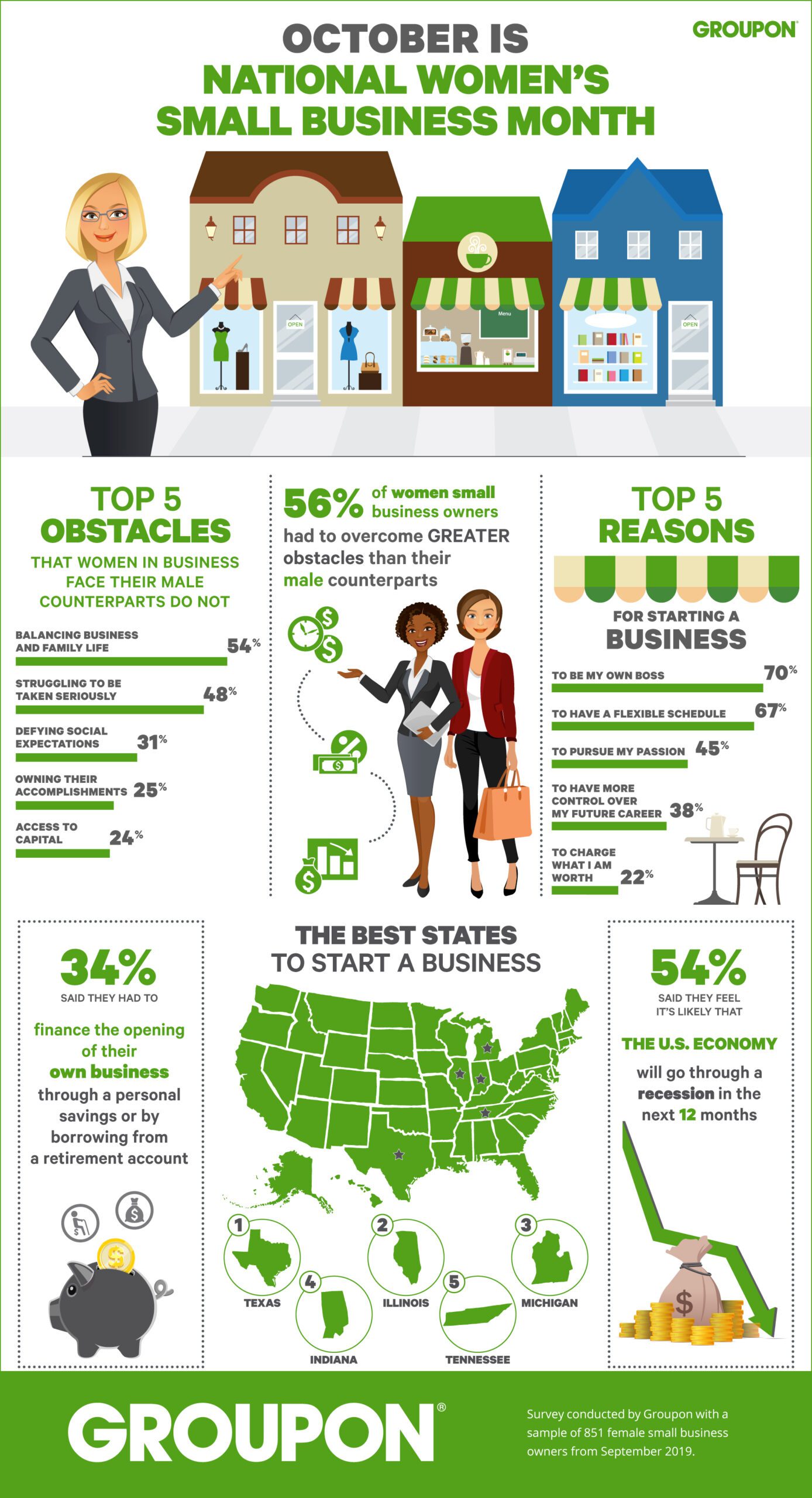New York office - 646-873-7565 / usnews@swns.com
NEWS COPY w/ VIDEO & INFOGRAPHIC
More than half of women small business owners believe they overcame greater obstacles than their male counterparts, according to new research.
With one out of every five small businesses failing before the end of their first year*, a poll of over 850 female small business owners found 56 percent felt they faced greater challenges than their male counterparts when starting their business.
And half of those surveyed revealed they were held to a higher standard when trying to open their business.
Conducted by OnePoll in conjunction with Groupon for October's National Women's Small Business Month, the survey looked into a variety of topics, including the challenges faced by female entrepreneurs, the best states for women to open a business and why these entrepreneurs decided to become their own boss.
The survey also delved into how women business owners achieved success and the most important issues they want to see addressed in the 2020 presidential election.
There are some unique challenges women in business face that their male counterparts do not. Seventy-one percent of female small business owners say that when they opened their business they had to go through unexpected challenges.
These challenges included balancing a business and family (54 percent), struggling to be taken seriously (48 percent), defying social expectations (31 percent), owning their accomplishments (25 percent) and access to capital (24 percent).
A surprising 34 percent of women small business owners say they had to finance the opening of their own business through a personal savings or by borrowing from a retirement account.
According to the results, Texas (a state with no income tax), Illinois, Michigan, Indiana and Tennessee are the best states for women to start their own business.
Massachusetts, New Jersey, Washington, South Carolina and Ohio rounded out the top 10 best states for women in business.
The top five ways identified by survey respondents in which state officials can help small businesses are: lowering or simplifying taxes (50 percent), offering more small business resources (46 percent), improving access to health care and insurance benefits (36 percent), making housing more affordable (20 percent) and creating greater access to capital (17 percent).
According to the survey results, being your own boss (70 percent), having a flexible schedule (67 percent), pursuing your passions (45 percent), gaining more control over your future (38 percent) and receiving equitable pay (22 percent) were the top five biggest reasons women went into business for themselves.
Of surveyed respondents, it took an average of nearly three years to make their small business a success.
The women entrepreneurs studied said putting in the hard work (66 percent), taking pride in the quality of their product or service (57 percent), building a personal network (38 percent), serving an underserved market or space (25 percent) and having innovative business ideas (24 percent) were the biggest keys to their success.
Thirty-six percent of survey participants said they work more than 40 hours per week, and 76 percent stay up at night worrying about the success of their business.
“As one of the largest marketplaces of small businesses anywhere in the world, we’re thrilled to honor female entrepreneurs and recognize the contributions and value they bring to our lives on a daily basis and the communities we call home,” said Sarah Butterfass, chief product officer and "Women at Groupon" executive sponsor.
“Many of the women that we interviewed had to overcome unique challenges in order to get their small business off the ground and offered a number of key insights for those women thinking about starting their own business.”
Women small business owners were split on the Trump administration’s impact on small business – 32 percent of those surveyed said that the administration has had a positive impact on their business while 31 percent said that it had had a negative impact.
When it comes to the Democratic presidential candidates, more than half of the women small business owners who plan to vote during the primaries don’t think any of the candidates will positively impact small businesses.
National Women’s Small Business Month was created by the Small Business Administration to celebrate the contributions of women-owned businesses. According to the American Express 2019 annual State of Women-Owned Businesses Report, there are nearly 13 million women-owned businesses in the United States -- supporting over 9 million jobs and generating $1.9 trillion in revenue.**
*https://www.sba.gov/sites/default/files/advocacy/ Frequently-Asked-Questions- Small-Business-2018.pdf
1. To be their own boss 70%
2. To have a flexible schedule 67%
3. To pursue their passion 45%
4. To have more control over their future career 38%
5. To charge what they are worth 22%TOP 10 CHALLENGES SMALL BUSINESS OWNERS FACE
1. Generating more clients 32%
2. Balancing business and family life 25%
3. Staying energized 23%
4. Increasing profits 24%
5. The economy 20%
6. Keeping up with all the various social media platforms 20%
7. Federal income taxes 19%
8. Coping with a fear of failure 19%
9. Growing revenues 18%
10. Tough to know where to advertise to the right customers 18%TOP 5 WAYS STATE’S POLICY MAKERS CAN HELP SMALL BUSINESS OWNERS SUCCEED
1. Lowering or simplifying taxes 50%
2. Offering more small business resources 46%
3. Improving access to healthcare and insurance benefits 36%
4. Making housing more affordable 20%
5. Creating greater access to capital 17%
TOP 5 OBSTACLES WOMEN IN BUSINESS FACE THEIR MALE COUNTERPARTS DO NOT
1. Balancing business and family life 54%
2. Struggling to be taken seriously 48%
3. Defying social expectations 31%
4. Owning their accomplishments 25%
5. Access to capital 24%

![]()




